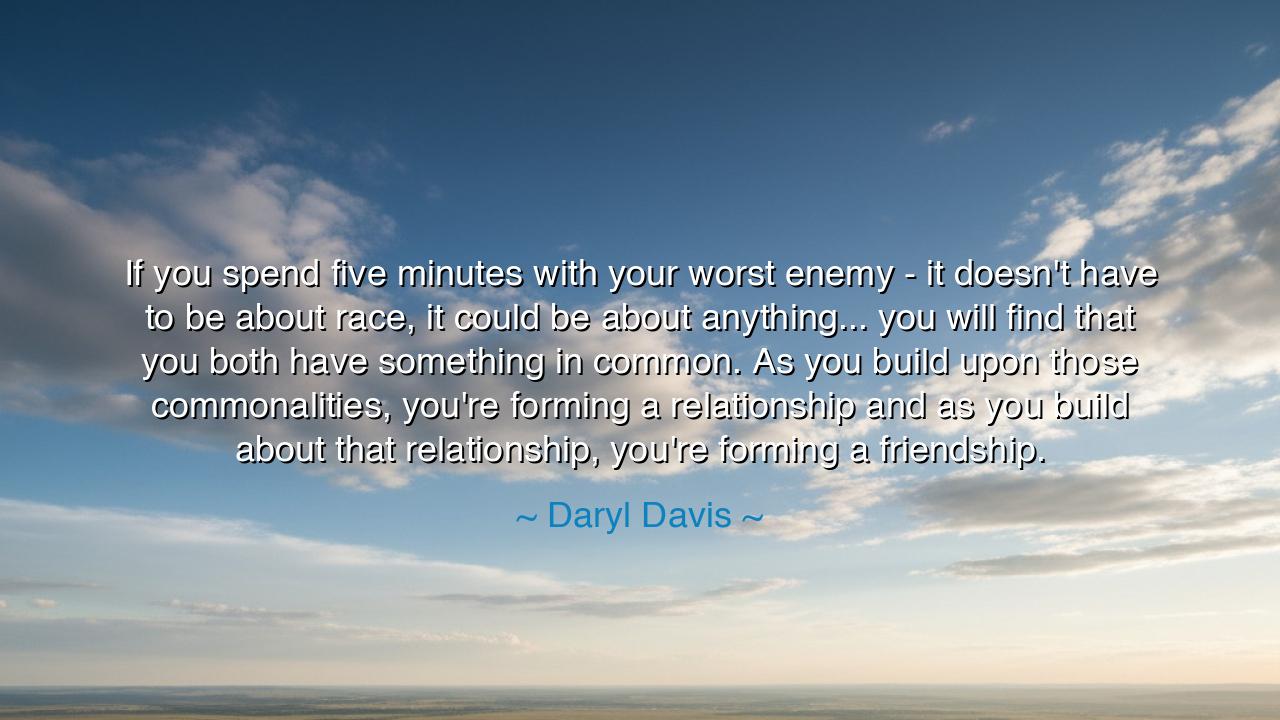
If you spend five minutes with your worst enemy - it doesn't have
If you spend five minutes with your worst enemy - it doesn't have to be about race, it could be about anything... you will find that you both have something in common. As you build upon those commonalities, you're forming a relationship and as you build about that relationship, you're forming a friendship.






Hearken, O seekers of wisdom, to the profound words of Daryl Davis, whose life teaches that the barriers of enmity can be dissolved through understanding: “If you spend five minutes with your worst enemy – it doesn't have to be about race, it could be about anything… you will find that you both have something in common. As you build upon those commonalities, you're forming a relationship and as you build about that relationship, you're forming a friendship.” In these words lies a timeless truth: the seeds of friendship often grow where we least expect them, even amidst conflict and hostility.
The origin of this insight flows from Davis’s lived experience as a musician and peacemaker. Confronted by hatred and bigotry, he discovered that even those who seemed irreconcilably opposed to him shared threads of commonality—music, curiosity, or simple humanity. By acknowledging and cultivating these shared qualities, Davis transformed encounters of animosity into opportunities for dialogue, understanding, and ultimately, friendship. The lesson is ancient and enduring: beneath the surface of conflict, the heart of connection may yet be found.
Consider the life of Oskar Schindler, who in the midst of war and division recognized shared humanity among Jews and Germans. By focusing on common ground—the value of life, work, and dignity—he forged bonds of protection and compassion, saving countless lives. Like Davis, Schindler’s actions reveal that recognizing shared purpose and building upon it is the path from tension and opposition to connection, illustrating that even amidst the harshest circumstances, friendship can be cultivated.
The essence of this teaching lies in the courage to seek understanding where fear or hatred predominates. Enmity, whether personal, cultural, or ideological, often obscures the commonalities that unite us. Friendship is forged not by ignoring conflict, but by engaging with it, listening, and discovering shared experiences and values. From these foundations, dialogue arises, empathy is nurtured, and the bridge from opposition to kinship is built.
Even in literature, one observes this principle. The dialogue between Romeo and Juliet’s feuding families, if transformed into understanding rather than hostility, exemplifies the latent possibility of connection through common purpose. Had the Montagues and Capulets sought the humanity in one another, even a brief encounter might have revealed shared desires for love, security, and honor. Davis’ insight teaches that these moments of recognition—though fleeting—are the building blocks of enduring friendship.
Davis’ reflection also carries a moral imperative: in the face of enmity, one must have the courage to engage, listen, and seek common ground. Friendship is not born from agreement or ease, but from the patient labor of finding shared humanity in the midst of discord. By acknowledging mutual interests, values, or aspirations, one forms the foundation for relationships that transcend prejudice, fear, or hatred.
Practical guidance flows naturally from this wisdom: approach conflict with curiosity rather than judgment, seek points of commonality, and nurture understanding through dialogue. Invest time in listening and observing, even with those you consider adversaries, for these moments may reveal the foundations of trust, empathy, and lasting friendship. Small steps of engagement have the power to transform relationships and dismantle barriers that seemed insurmountable.
Thus, remember the teaching of Daryl Davis: even with your fiercest adversary, the seeds of friendship lie in the recognition of shared humanity. Take time to uncover common ground, build relationships upon it, and allow bonds of understanding to flourish. In this practice, hearts are healed, divisions are bridged, and the enduring power of human connection is revealed—a lesson both heroic and deeply human.
If you wish, I can also craft a short, lyrical version for audio narration, emphasizing the emotional and transformative power of forming friendship from enmity. Do you want me to do that?






AAdministratorAdministrator
Welcome, honored guests. Please leave a comment, we will respond soon